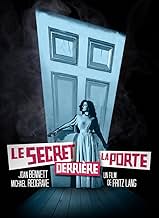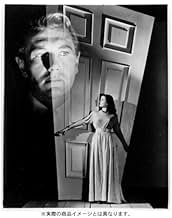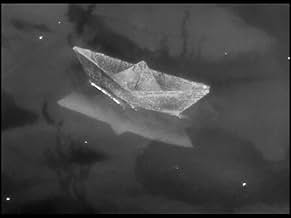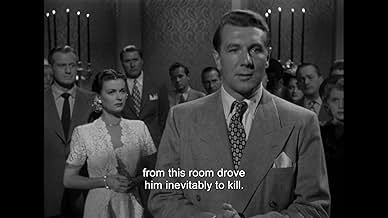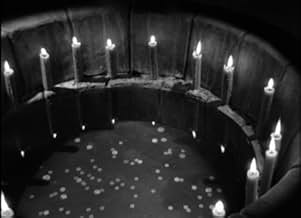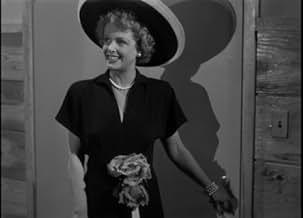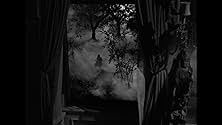Füge eine Handlung in deiner Sprache hinzuAfter a lovely woman and her new husband settle in an ancient mansion on the East coast, she discovers that he may want to kill her.After a lovely woman and her new husband settle in an ancient mansion on the East coast, she discovers that he may want to kill her.After a lovely woman and her new husband settle in an ancient mansion on the East coast, she discovers that he may want to kill her.
- Regie
- Drehbuch
- Hauptbesetzung
- Altar Boy
- (Nicht genannt)
- Townsman
- (Nicht genannt)
- Sarah
- (Nicht genannt)
- Guest in Home Tour
- (Nicht genannt)
- Guest in Home Tour
- (Nicht genannt)
- Judge
- (Nicht genannt)
- Small Mexican Knife Fighter
- (Nicht genannt)
- Country Squire
- (Nicht genannt)
Empfohlene Bewertungen
Dazzling Hitch/style suspense movie about a beautiful woman marries a rare man with a shock revelation around every corner their mansion . It packs hallucination , treason , Bennett plays a rich wife trying to help her hubby , well played by Michael Redgrave , who is suffering from amnesia and who might be a murderer too . The picture takes elements from classic Hitchcock films , carrying out a crossover among ¨Suspicion ¨, ¨Spellbound¨ and ¨Rebeca¨ . In fact ,Fritz Lang's attempt to do his version of Rebeca (1940) was a project fraught with disaster. It ran over budget and over schedule, while Lang was at constant loggerheads with his leading lady, Joan Bennett . As it stars the great Joan Bennett , being compellingly directed by Lang ; but it is not as outstanding as their former movies together : ¨Man hunt¨, ¨The woman in the window¨ and ¨Scarlet street¨. Support cast is pretty good such as Anne Revere as Caroline Lamphere , Barbara O'Neil as Miss Robey and Paul Cavanagh as Rick Barrett .
Atmospheric as well as mistly cinematography in black and white by Stanley Cortez . Thrilling and frightening musical score by the classic Miklos Rozsa . The motion picture was professionally directed by Fritz Lang . Lang directed masterfully all kind of genres as Noir cinema as ¨Big heat , Scarlet Street and Beyond a reasonable doubt¨ , Epic as ¨Nibelungs¨, suspense as ¨Secret beyond the door, Clash by night¨ , Western as ¨Rancho Notorious and Return of Frank James ¨ and of course Adventure as ¨Moonfleet¨ .
The story concerns a beautiful woman, Celia (Joan Bennett) who falls madly in love with a mysterious and moody man, Mark Lamphere (Michael Redgrave) whom she meets while on a trip. She goes to live with him at the family home, which is run by his sister (Anne Revere). It's there she discovers a few things. One is that Mark was married before, is a widower, and has a son (Mark Dennis). Mark also has a secretary (Barbara O'Neil) who covers one side of her face with a scarf to cover a scar from a fire. Mark, she finds, also has a wing where he houses a collection of rooms in which famous murders have taken place. There is one room, however, which is always kept locked. Celia wants to know what's beyond that door, and what makes her husband so moody.
"Beyond the Door" takes inspiration from two other Hitchcock films, Spellbound and Notorious, and taps into the postwar interest in psychology. There is a voice-over narration from the troubled Celia, who recounts her dreams. The film is very atmospheric, the music grand and suspenseful and, though one may be able to guess how it ends, the story is very intriguing. The ending, due to some narrative gaps, is somewhat disappointing.
This isn't Lang's best film but one can certainly see the master's touch in the gloom, the fixation on the door, and the cinematography. Joan Bennett (whom I saw in person and was unbelievably tiny) shines as she usually did under Lang's direction. She could play both sophisticated and glamorous as well as trashy and sweet-smart. Here, in a funny way, she combines both - the character is a bit of a classy femme fatale. Redgrave is properly passionate one minute and distant and a little weird the next. I would have loved to have seen someone like Dirk Bogarde tackle this role a few years later.
Derivative but very good.
Being the 40's the Freudian overtones are overpowering, as the husband, Michael Redgrave in his first Hollywood role, seems to be over-reacting to years of unhealthy female influence and dominance in his life as his mood swings like, well, I guess you'd say, a door.
In the background there's an apparently disfigured housekeeper Miss Robey, Redgrave's supportive sister and his difficult, moody son but the main tension is between the leads as it builds gradually to a fiery ending.
The plot may creak at times like an old floorboard, Redgrave and Bennett are somewhat stiff and cold in their parts and the continuity isn't all it could be, but if like me you like film noir settings then this is for you too. Thus we get Bennett's interior monologues, lots of shots of her in front of mirrors, lots of scenes with darkened doors and symbolic keys, and even a shroud-like mist followed by a thunderstorm on the climactic night. There are some great shots of starkly-lit corridors and a wonderfully imaginative dream sequence (yes, it has those too) of Redgrave's where he's prosecuting himself in front of a judge and jury whose faces are in shadow. Dmitri Tiompkin's atmospheric score adds a lot to the overall mystery and dread, particularly at the end.
This may not be Lang's best American film but there was more than enough in it to keep an avowed fan like me keenly watching.
Fritz Lang's bleak cinematography and haunting use of music help to create the atmosphere that a story of this nature needs in order to work effectively. The focus on the door helps to create the tension as to what the secret is throughout the movie, and Fritz Lang seems keen to capitalise on that as we see Joan Bennett's narration change from how she feels personally to driving herself crazy as she tries to decipher what's behind the door. The characters in the story are interesting, and they need to be as this film is mostly character based. We follow Celia Lamphere, and we are given her thoughts by way of the aforementioned narration. Narration is often found in scripts that have been written by people that don't know how to write good scripts. However, in this case it actually helps the film to move along. In order for the story to work, we need to know what the character is feeling, so in this case narration is helpful to the story.
As I've mentioned, the ending isn't all that good, but the suspense builds nicely and there's much to like about this film. If you're new to Fritz Lang, though, I certainly recommend the classics 'M' and 'Metropolis' before this, and also from his American films; 'Fury', 'Scarlet Street', 'Beyond a Reasonable Doubt' and 'While the City Sleeps' get my thumbs up.
I watched this on the back of positive reviews from a couple of people on this site; perhaps I should have read further though because I didn't find the wonderfully intelligent noir that they claimed to have seen. Perhaps these commentators have not seen the film Rebecca which sort of covers similar themes but does it much, much better than this film does, but for me I found it hard to care about this. Visually I liked it and credit to Lang because his direction and work with his cinematographer does produce some really well set up scenes that do have great atmosphere. However this is not repeated in the material which is not as intelligent as it would like to think itself. Indeed it is terribly overwrought and melodramatic and offers little to counter it.
As a result the cast have to thanklessly play it up the best they can. I thought than Bennett did as good a job as she could have hoped to have done. She isn't brilliant though but she plays detective well. More important but not much cop is Redgrave; OK the blame lies more on the material than in his performance but given how little was conveyed by words at times, his performance was important but not up to the task.
Overall then, a fairly overdone melodrama that doesn't really convince in how it uses psychoanalysis to inform and direct its narrative. It may look great but the substance just isn't there from the start right down to the insultingly simplistic final scene.
Wusstest du schon
- WissenswertesThe grove of trees through which Celia (Joan Bennett) runs when she flees the house is the same grove through which the Wolf Man ran in Der Wolfsmensch (1941), also made by Universal. In particular, the tree, against which she leans, is the same one under which the Wolf Man was beaten.
- PatzerWhen Celia takes an impression of the key in wax, she only takes the impression on one side, which would render the key made from that impression useless without the reverse side.
- Zitate
Mark Lamphere: You were living that fight. You soaked it all in - love, hate, the passion. You've been starved for feelings - any real feelings. I thought: 20th Century Sleeping Beauty. Wealthy American girl who has lived her life wrapped in cotton wool but she wants to wake up. Maybe she can.
Celia Barrett: Is it as hard as all that?
Mark Lamphere: Most people are asleep.
- VerbindungenFeatured in Vampira: Secret Beyond the Door... 1947 (1956)
Top-Auswahl
- How long is Secret Beyond the Door...?Powered by Alexa
Details
- Erscheinungsdatum
- Herkunftsland
- Sprachen
- Auch bekannt als
- Secret Beyond the Door...
- Drehorte
- Produktionsfirma
- Weitere beteiligte Unternehmen bei IMDbPro anzeigen
Box Office
- Budget
- 1.500.000 $ (geschätzt)
- Laufzeit
- 1 Std. 39 Min.(99 min)
- Farbe
- Seitenverhältnis
- 1.33 : 1

